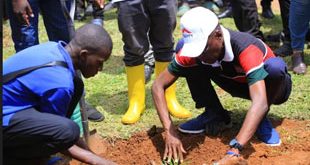
Cape Town, South Africa | THE INDEPENDENT | Four young Ugandans have started a six month training and mentoring programme after they recently made the shortlist of the prestigious Africa Prize for Engineering Innovation.
The four Ugandans are among 16 talented engineers selected from Cameroon, Ghana, Kenya, Nigeria, Rwanda, South Africa and Uganda. The 2018 shortlist for the Africa Prize for Engineering Innovation was announced in Cape Town, South Africa on November 15.
The shortlist recognises the most talented African engineers from across sub-Saharan Africa, including innovators working to make malaria and reproductive health tests easier, using dolphin-inspired echo-location for visually impaired people, and recovering precious metals from car parts for re-use in manufacturing.
Brian Gitta has developed Matibabu, a low-cost reusable device that tests for malaria quickly and accurately without drawing blood, while Alvin Kabwama’s UriSAF healthcare kit tests urine for infections quickly, accurately and affordably.
Arthur Woniala has developed Khainza Energy Gas – a cheap biogas made from manure and safe for household use. The fourth candidate, Lawrence Okettayot’s innovation is Sparky Dryer – a low-tech dehydrator that dries fruit and vegetables to extend their shelf life and reduce food wastage.
After six months’ mentoring and training, four finalists will be selected from the shortlist. In June 2018 the finalists will present their businesses to judges in front of a live audience, after which one winner will receive £25,000, and three runners up will be awarded £10,000 each.
The Africa Prize for Engineering Innovation founded and launched by the Royal Academy of Engineering in 2014, is Africa’s biggest prize dedicated to engineering innovation. It encourages talented sub-Saharan African engineers, from all disciplines, to develop local solutions to challenges in their communities.
The Prize selects innovators from across the continent and provides training and mentoring to help turn engineers with incredible ideas into successful entrepreneurs.
Each of the 16 engineers will develop skills that last a lifetime, and become part of a growing community of talented African engineers working to accelerate socio-economic development through business.
The shortlist, which represents the fourth group of engineers supported through the Africa Prize, also features several digital innovations. Among them are mobile apps that grant micro-loans within minutes, an app that makes it easy for musicians to manage bookings and sell merchandise, and another to help commuters book one of the 20,000 trips taken daily on motorcycle taxis in the city of Kigali, Rwanda.
Agricultural innovations also feature strongly. They include sensors that send soil information to farmers’ phones straight from the field, an online platform that helps farmers triple their yield, and a low-tech dehydrator that extends the shelf-life of crops tenfold, improving food security.
“Turning engineers into entrepreneurs is vital to unlocking the creative solutions that exist across Africa,” said Africa Prize judge, Moses Musaazi. “The Africa Prize’s support gives engineers the confidence to approach funders, clients and investors, and the knowledge to improve their supply chain and business models.”
The Africa Prize also recognises process engineering, represented this year by innovations to generate power from the many radio waves that are around us every day; and for producing affordable biogas from manure for household use.
Two educational solutions include an app that hosts a variety of courses, and a mini-science lab that fits into an ordinary school backpack.
A smart meter that allows customers to manage their utilities, and a solar-powered walk-in cold room complete the impressive shortlist.
“The Africa Prize recognises talented engineers from across the continent – supporting countries that aren’t typically seen as a source of innovation,” said Rebecca Enonchong, Africa Prize judge. “This diversity helps drive more innovation during the programme, amplifying their potential for real economic and social impact.”
The shortlisted candidates are:
- Alvin Kabwama from Uganda with UriSAF Maternal and Sexual Reproductive Health Care Kit, which tests urine quickly, accurately and affordably
- Arthur Woniala from Uganda with Khainza Energy Gas, a cheap biogas made from manure and safe for household use
- Brian Gitta from Uganda with Matibabu, a low-cost reusable device that tests for malaria quickly and accurately without drawing blood
- Lawrence Okettayot from Uganda with Sparky Dryer, a low-tech dehydrator that dries fruit and vegetables to extend their shelf life and reduce food wastage
- Brian Mwiti Mwenda from Kenya with The Sixth Sense, a handheld echolocation device with ultrasonic sensors that alert visually impaired users to objects nearby
- Collins Tatenda Saguru from South Africa with AltMet, an economical, environmentally sustainable process to recover and re-use precious metals from cars
- Daniel Taylor from Ghana with HWESOMAME, a low-cost smart sensor that accurately detects soil conditions and notifies farmers via text or phone call
- Emeka Nwachinemere from Nigeria with Kitovu, an online platform that helps farmers in remote locations to increase crop yields and sell their produce
- Esther Gacicio from Kenya with eLearning Solutions, an interactive online programme that hosts courses for individuals or serves as a tool for training institutions
- Ifediora Emmanuel Ugochukwu from Nigeria with iMeter, which gives electricity consumers and power utilities more control over electricity use
- Michael Asante-Afrifa from Ghana with Science Set, a mini science lab with all the materials needed to do the science experiments in a school syllabus
- Monicah Mumbi Wambugu from Kenya with Loanbee, a mobile phone application that calculates the user’s credit scores and grants micro-loans
- Nges Njungle from Cameroon with Muzikol, an online music marketing and social media app designed to meet all the career needs of musicians
- Nnaemeka Chidiebere Ikegwuono from Nigeria with ColdHubs, solar-powered walk-in cold rooms that extend the life of perishable food tenfold
- Peter Kariuki from Rwanda with SafeMotos, an app that connects commuters to the safest motorcycle drivers in Kigali, Rwanda
- Shalton Mphodisa Mothwa from South Africa with AEON Power Bag, which allows users to charge their phones on the go by converting radio waves and solar energy into power.
 The Independent Uganda: You get the Truth we Pay the Price
The Independent Uganda: You get the Truth we Pay the Price



Wow success to them bambi